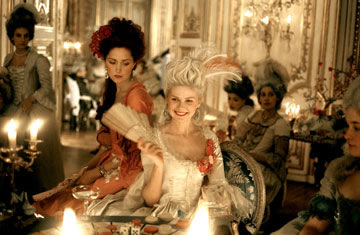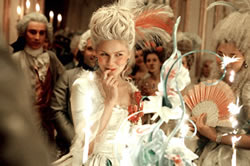
Are We All Eating Cake?
By Karin Badt
Marie Antoinette
A film directed by Sofia Coppola
Marie Antoinette has nothing to do with
history--at least in Sofia Coppola's new film. Rather Coppola's
Marie Antoinette (played by a dimply Kirsten Dunst) is an American
prep school kid playing Queen in her spare time--which is what
this film is about, the spare time of the rich and lonely. The
film starts with Marie Antoinette all sleepy in her blonde curls,
tucking her dog to her pure white chest, while before her a window
to the outside world opens. It never completely opens: the rest
of the movie shows her trapped in sumptuous Versailles rooms,
gawked at by courtiers, making love for public consumption (to
produce an heir), and dozing in a chair while four sleepy suitors
play guitar.
The perks of Marie Antoinette's life are
the sumptuous gifts of the film: the "jasmine tea that flowers
in tea cup" from a Chinese emperor, the pink teardrop earrings,
the pretty ruffled gowns. The climax, filmed to Bow Wow Wow pop,
is a fast-paced pastiche of strawberry cake, game pieces, bubbling
champagne, yellow pumps, pink Converse sneakers (one of many surprise
anachronisms), and a dog wearing a diamond necklace drinking bubbly:
all ending with the proverbial cake squished in the queen's pretty
mouth.
The French Revolution? The event is not
present for this California girl. The film's last line is "The
party's over," with a shot of a chandelier shattered on the floor
(the mob has come): a recall of the similar ending of "Virgin
Suicides," with a tiara on the ground. That is what the French
Revolution is for an alienated American prep school girl: an abrupt
finish. When the revolution happens, it's just sad. The movie
finishes with one last nostalgic look of the sun setting on playground
Versailles .
Coppola has blithely stated she could not
care less about the political context of her subject. Marie Antoinette
was not interested in politics so why should she be?
Her bravado ignorance is astonishing. "I
just liked the idea of teenagers with Versailles as their playground,"
Coppola quipped at the Cannes press conference last spring.
She errs. Versailles was no playground
for anyone, no counterpart to a coke party on the Cape. "Every
aspect of Versailles was political," comments University of Toronto
historian Paul Cohen. "Court life was about games, gambling, sociability:
who is in favor with the king or queen or isn't, who is invited
to hunting parties. Balls were political. Proximity was power."
This is not Coppola's Versailles, where
the Petit Trianon is built to satisfy a poor lonely doll's need
"to shop and party" (the anachronism that most defines the film)
and court life has nothing to do with power. The greatest intrigue
here is Marie Antoinette's catty competition with Madame Barry,
her father-in-law's mistress: "did you see what she's wearing?"
For a film treating the most volatile,
complicated time in France 's history -- where democracy and terror
forged templates for the modern world -- it is indeed astonishing
that so little happens. Coppola oddly did not take advantage of
the rich details of Marie Antoinette's real life to complicate
her vision, extracting only what she needed from Antonia Fraser's
biography. She shows Marie Antoinette as a perpetual child, frozen
in adolescence.
In reality, Marie Antoinette evolved from
the time she took the throne as the l4-year-old daughter of Empress
Marie Therese of Austria, to the time she was forced to leave
Versailles at age 33. Throughout her reign, she was attacked in
pamphlets as the wicked foreign queen, feared for her ability
to influence Louis to take non-French stands and in constant fear
of the hunger riots. By her final years, Marie Antoinette, commanding
mother and negotiator, had evolved so far from dejeune schoolgirl
that she was writing her brother Emperor Joseph in Austria to
garner insurrectionary troops to put down the revolution. She
was executed, along with her husband, not as a symbol of decadent
monarchy (the taunt "let them eat cake" is apocryphal) but as
a political traitor.
 Marie
Antoinette not only dealt constantly with politics; she was
politics. Her marriage, organized for her by her powerful mother,
was an alliance of the Austrian and French powers. The intense
attention given her initial inability to have children was not
a psychological issue, as portrayed in the film (Dunst is mortified
about what the other ladies will think), but crucial to France
's position in Europe. The seven-year barren phase that Coppola
casts as Marie's inability to seduce an asexual, dumpy husband,
despite her charming curves, was not a lust problem but a medical
problem. Louis XVI's member was too big to allow for a comfortable
erection; an operation, cutting the foreskin, led to the dynasty's
continuation.
Marie
Antoinette not only dealt constantly with politics; she was
politics. Her marriage, organized for her by her powerful mother,
was an alliance of the Austrian and French powers. The intense
attention given her initial inability to have children was not
a psychological issue, as portrayed in the film (Dunst is mortified
about what the other ladies will think), but crucial to France
's position in Europe. The seven-year barren phase that Coppola
casts as Marie's inability to seduce an asexual, dumpy husband,
despite her charming curves, was not a lust problem but a medical
problem. Louis XVI's member was too big to allow for a comfortable
erection; an operation, cutting the foreskin, led to the dynasty's
continuation.
As politics, the film fails miserably,
and as biography, it is an insult to Marie Antoinette. But it
also fails on its own terms as a story. It is like a rock video
of loneliness on a lavish set: static, inert, with no dramatic
arch or meaning beyond the parade of consumption and boredom.
Despite all this, from the time of its
debut in France, the film has met with many excited fans, including
top American and French critics. Cahiers du cinema editor
Jean-Michel Frodon thought the film should have won at Cannes.
"Coppola's a genius at expressing the sense of étrangete
[alienation]," mused Frodon. "Marie Antoinette is an adolescent
who doesn't like the rules, as we all are. The individual versus
the collective is a serious topic." Despite a few boos at the
Cannes premiere, the French accepted the facile treatment of class
and politics. The film ran 4th at the box office for the first
weeks of its release, and received acclaims from the most prominent
journals in Paris: Cahiers du Cinema, Positif, Inrockuptibles,
Le Monde.
Jane Campion defended Coppola, one of her
few successful fellow women directors. "Good for her," she confided
to me over coffee. "She films what she knows." Namely, the depiction
of an alienated teenage girl, who feels claustrophobic in her
room and awkward with other people: the same subject as Coppola's
prior films, Virgin Suicides and Lost in Translation.
The film also promises to do well in the
U.S. [where it opened on October 20]. Lincoln Center Film
Comment Editor Gavin Smith has given it his thumbs up: sure
it's superficial, Smith noted, but his magazine can defend that.
This complacent response to a piece of
Hollywood consumerism and indulgence in adolescence, way past
the age of adolescence (for both Marie Antoinette and Coppola)
points to how childlike our audiences--and even our top critics--have
become. Why hasn't anyone pointed out that Coppola's film partakes
in the very bubbly consumerism at the root of her characters'
malaise?
It could be that spectators--and critics--are
caught up in the same bubble themselves. That the French have
accepted such an ahistorical, sanitized view of their infamous
queen--and controversial Revolution--says a lot about their confusion
about their own identity. Depictions of the French Revolution
have been flashpoints of French identity politics since 1789,
litmus tests of where the country is going: left, right, or nowhere
in particular. Hailed as a heroic event during the Marxist 1960s,
the Revolution was just as strongly reviled, identified with the
Terror, at the bicentennial when class struggle was out of fashion.
French revolution films have followed the trends: Renoir's 1938
film La Marseillaise, during the heyday of the Popular
Front, featured lively intellectual partisan revolutionaries critiquing
the arbitrary power of the authorities: a veiled critique of fascism.
Rohmer's L'Anglaise et le Duc (2001) went conservative:
the revolutionaries are dirty beasts who paw elegant ladies about
to have their heads cut off. And in this latest import, the Revolution
is missing entirely.
It may be no coincidence that the French
populace is enjoying a Marie Antoinette purged of all politics
at a time when France is tottering through its 5th republic, with
scandals hitting left and right (i.e. the Clearstream affair),
and Prime Minister Villepin is viewed contemptuously for mishandling
last year's youth protests, as reviled as Marie Antoinette in
her heyday. The country is in crisis, many say, insecure about
economic and physical security, and skeptical of the left and
the right. Perhaps depoliticizing royalty is a way to avoid political
thinking.
"It's the white telephone effect," explained
Annie Duprat, a Marie Antoinette scholar at the University of
Versailles, referring to the blowsy films most appreciated in
fascist Italy and France: films that showed Hollywood ladies lounged
on white beds with white phones. "People want to see bourgeois
aesthetics on film, to distract themselves from the real problems."
"It's the same phenomenon as American
Idol and Lost," comments Revolutionary scholar Lynn
Hunt. "A historical figure long disdained by 'serious' intellectuals
as shallow, excessively consumerist ('let them eat cake'), and
out of touch with the misery of her times is now embraced by those
who are tired of being considered shallow, excessively consumerist
and out of touch with the misery of the world."
If the French don't care, forget the American
public--already at ease with movies and books that don't detract
from a middle-class suburban view, and ready to proclaim the latest
artistic splurge of "self-expression"--the most revealing navel-gazing
memoir--as high art. The film is sure to be a hit: aesthetic enough
to please, postmodern enough to receive critical acclaim, and
bland enough to satisfy an apolitical populace complacently accustomed
to eating cake.
